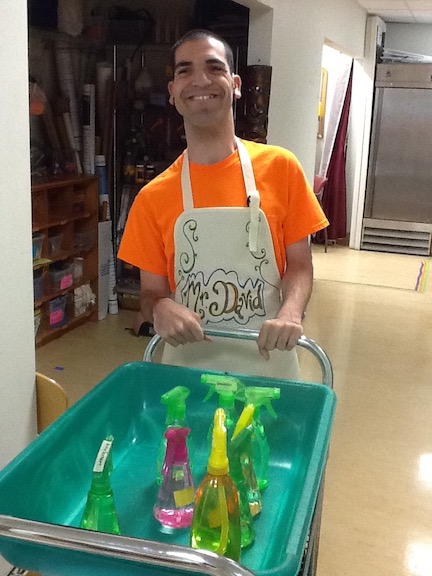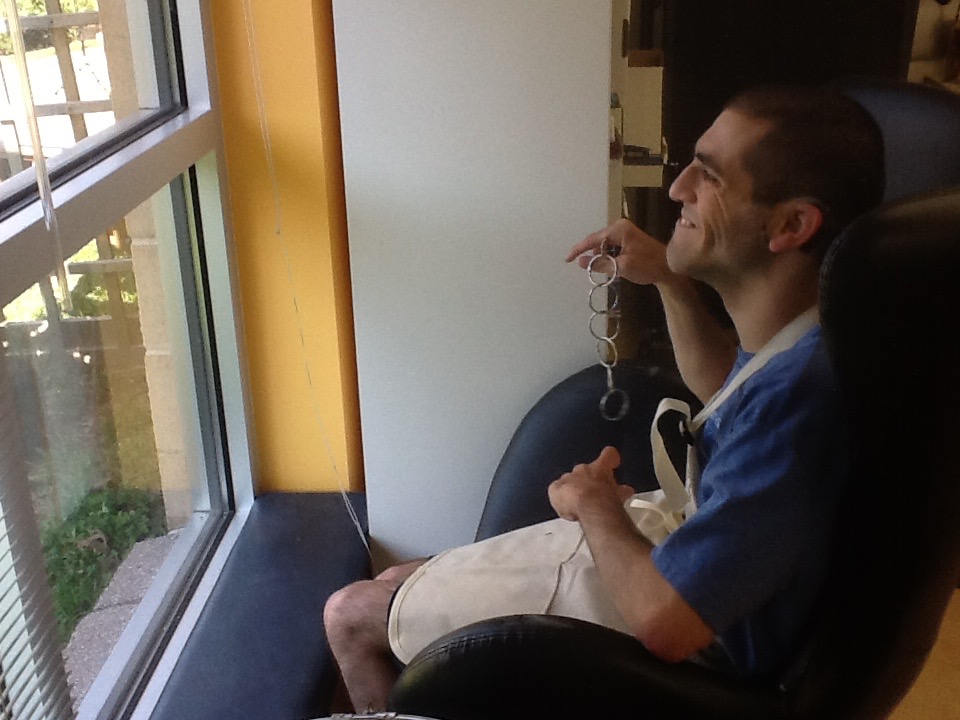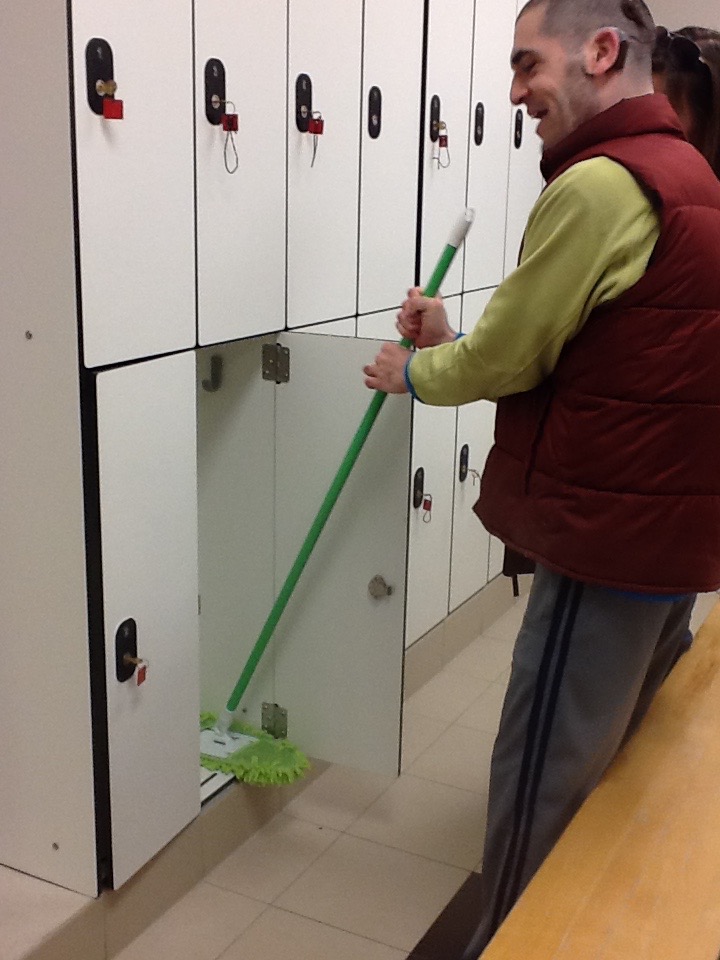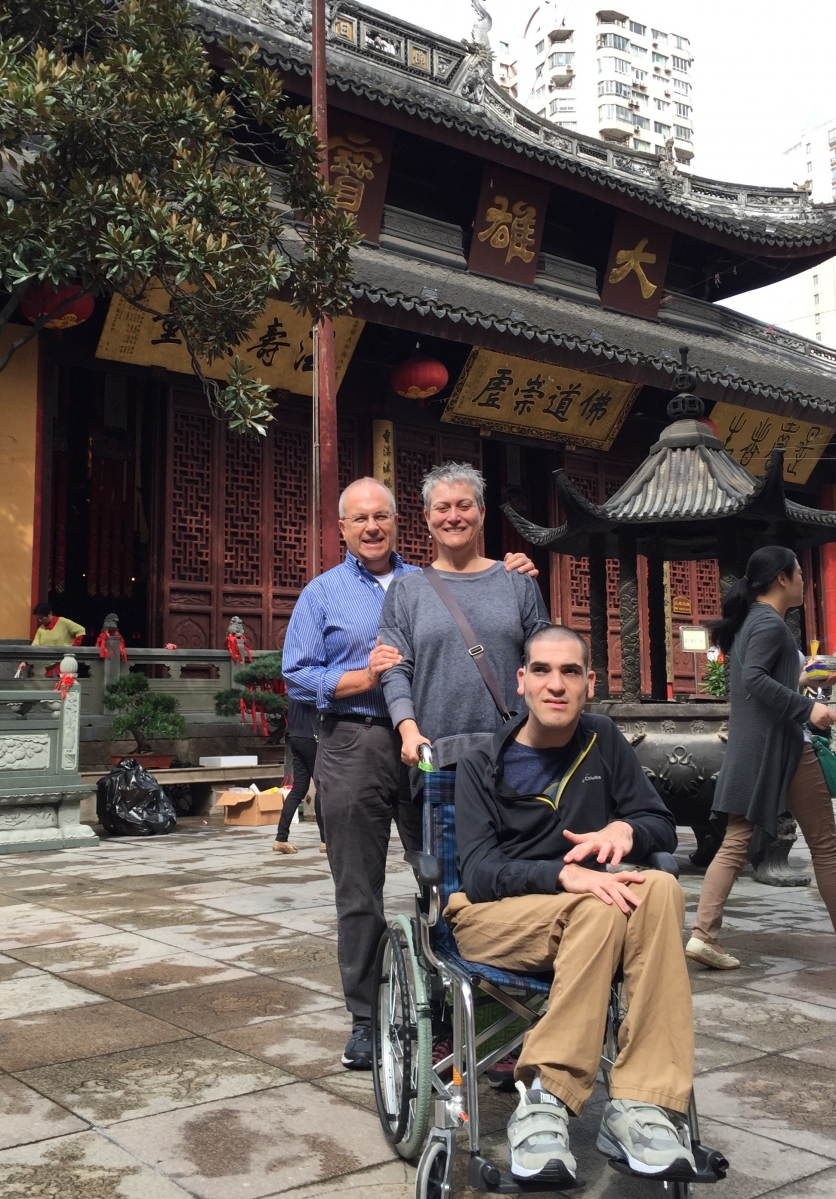David's Journey
Gwen shares her son's story. It is filled with experiences and strategies for supporting children who are deaf-blind through the journey of transition.
December, 2015
It's 8:00 am and I hear David's caregiver come in for another workday. It's hard to believe that our 22-year-old son will also be hard at work today. This seems like a dream, that our triplet son, who was born at 28 weeks, and almost didn't survive his first weeks of life, has grown up to be a young man, graduating from high school and starting his adult life with a full agenda of work, leisure activities, and fun social events.
Many times during the first 12 years of David's life the conversation was filled with "he can't do that," "how can he possibly learn to read and write," "you know that he's mentally retarded, don't you," "we can't get him to pay attention," and "he's not making much progress." We, as his parents, pushed the school system hard to make sure he was getting everything he needed. Home therapy worked diligently to teach him to walk, dress himself, brush his teach, and eat real food with a fork. Our group of parents of Deaf-Blind children and our professional mentors, through our NC DB project taught my husband and I that our David could do the things that others doubted he could. They taught us that he should have a good life, the best we could make for him, and that reaching for expectations like reading, writing, communicating by email, using a AAC device, and developing avocations and vocational skills, were worthy goals.

Early Years
David was born at 28 weeks. David had retinopathy of prematurity, would go on to develop cerebral palsy, lost his hearing due to antibiotics given at age 14 months, and has an intellectual disability. At age 3, the otolarnygologist told us he had hearing loss in the severe range, but maybe hearing aids would help him. After hearing many doctors and therapists telling us over and over that we just didn't know why David did not respond to toys that made sounds or picture books or other environmental stimuli, these were words of encouragement. Maybe these developmental problems were somehow tied to his hearing loss and his unknown visual status.
Our boy was Deaf-Blind. A whole cadre of people came to help us. The parent educator from BEGINNiNGS, the early intervention program, explained David's communication options, (we chose sign language instruction). The Department of Public Instructions Deaf-Blind Project provided free parent trainings at various retreats, access to unbelievable experts who have become life-long consultants, and the opportunity to meet other parents who got it! Deaf educators and enrollment in a deaf pre-school and a year in the NC School for the Deaf helped David begin to learn sign language. All along the way, these people, those who knew about and understood Deaf-Blindness, were there to teach and encourage us and show us the possibilities for David's future.
At age 14, David began the "transition planning" phase of life. We started talking about his future at home and with school officials and teachers. My husband and daughters started to envision a life for David that was consistent with the dreams for all of our children. Learn, be happy, be engaged in your community, find something that you love and do it!!
That summer David participated in a program called the Summer Work and Wellness Program. He would be assigned to a coffee shop in town and explore work tasks to see if he could do them. He and his caregiver went to the coffee shop for 2 hours every day and David learned to wash dishes, run the sanitizer machine, label cuffs for the hot cups, fold towels, and put away inventory. Every day, the caregiver now turned job coach, broke down the job into parts and taught David how to do them. The job coach video taped David doing the work and then David would watch the videos over and over. By the end of the summer, the employees asked if David could keep working instead of going back to school. In a short time, David had proved that he would be valuable on the job and he loved every minute at the coffee shop.

High School
When David started high school soon after that summer, he already had some work experience. His vocational facilitator was impressed with what she heard and began to expose David to many different jobs both in the high school and in the community. He worked in the school office filing attendance sheets, he washed, dried and folded the basketball team uniforms and folded towels and delivered them to the ceramics classroom. He set tables and put ice in cups at a senior center's daily lunch. He shredded papers at an insurance office, and folded towels, cleaned tables and swept the gymnasium floor at a Jewish Community Center.
David liked some of these jobs better than others. The ASL language facilitator at school became his job coach at these worksites. David learned to pay attention, do a complete and thorough job no matter what the work was, and he increased his productivity and speed over time. The coach tracked all of this and reported to us at meetings and on the report card. David kept working at the coffee shop after school and through each of the summers.
During the final years of high school the school-based team talked a lot about what David's life after graduation would look like. I led the discussion many times by saying that we had some concrete goals for him that included a balanced week: work, socializing, gym time and other recreation, and time with friends. We wanted David to use his AAC device to be able to communicate with friends and co-workers who didn't know sign language. Each year during IEP meetings or meetings for the ISP for Medicaid waiver services or VR services, we stressed these goals and laid out plans for David to achieve them. What we couldn't accomplish during school hours, David worked on at home or in the community with his caregiver. The after school work with his caregiver was critical. Through the after school jobs, David developed solid relationships with his co-workers and business owners.
At the same time the teacher was approaching employers, I had been talking to the director of the day care center that David went to when he was younger. I asked if she thought there were any opportunities for him to work part time at the center. She met with her staff to discuss the possibilities. Ten teachers who taught David still worked at the center and they were ecstatic at the prospect of him joining the staff. Some of them had not seen David in many years. When we met again, the list of possible work tasks that they needed help with matched beautifully with David's skills and abilities. With great enthusiasm they offered David a job.

Post-School
When David graduated from high school this past June, he was offered 35 hours of paid employment at three different businesses/organizations. He works as a dishwasher at the coffee shop, he cleans lockers and sweeps the gym floor at the community center, and he sanitizes toys and fills bottles with disinfectant solutions and delivers these items back to the center classrooms. He loves working at all of these places. These jobs all have growth potential and David has lots more to learn.
When I think about the last few years and the process of readying David for an adult life, a few things play over and over in my head. David loves and is loved by so many people. His easy going style and big smile make it easy for him to charm and engage others even though his communication is still so rough. He is a hard worker. His teacher always reminded me that he has a very strong work ethic. For someone with his level of disability it is surprising to find that level of work ethic. Every day he has a high level of motivation and anticipation to go out in the community and work and spend time in places he enjoys. When he comes home he answers this simple question - What did you do today at work, David? His answer? "Pay attention, work hard, clean many plates, clean toys, favorite, favorite." He is beaming when he tells us. He has such pride in his work and his accomplishments.
So it's 8:00 am and it's time for David to get up and embark on another day. Another fulfilling, happy day, working at places that are familiar yet challenging. Working with a giant smile. We are so proud of our boy. Who would have ever believed that David's life would be so full?
I've learned it's important to create a vision for David's future and keep focusing on it. It was essential to provide the supports necessary to make it happen. We couldn't have envisioned all of this when he was a baby. David is such a happy guy and we have seen him excel at things that he likes to do. He touches and inspires people that he comes in contact with. David has much to learn and many ways to grow in the future and we look forward to being there with him for the next chapters.
